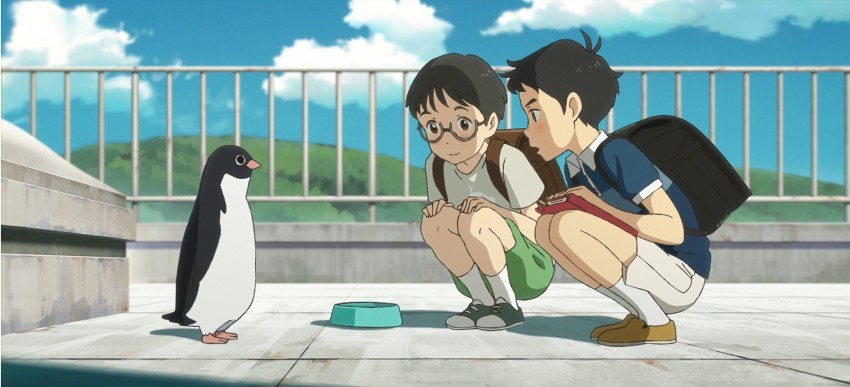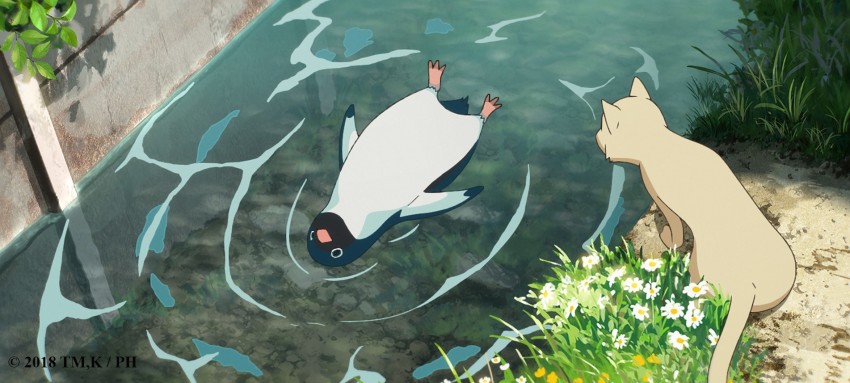Penguin Highway
October 20, 2020 · 0 comments
By Kambole Campbell.
 Reading the words ‘Penguin Highway’ together might feel like a hint towards a simplistic and joyous journey – after all, who doesn’t like penguins? It’s certainly the most straightforward title of any of Tomihiko Morimi’s novels – the most well-known are a little more illusive, namely The Tatami Galaxy, and The Night is Short, Walk on Girl.
Reading the words ‘Penguin Highway’ together might feel like a hint towards a simplistic and joyous journey – after all, who doesn’t like penguins? It’s certainly the most straightforward title of any of Tomihiko Morimi’s novels – the most well-known are a little more illusive, namely The Tatami Galaxy, and The Night is Short, Walk on Girl.
Directed by Hiroyasu Ishida, as an adaptation of a Morimi novel, Studio Colorido’s Penguin Highway shares a little bit of common ground with a couple of Masaaki Yuasa works – the aforementioned Tatami Galaxy and Night is Short. Like those two works Penguin Highway flirts with the surreal, mysterious objects (and flightless birds) built into a very human tale. Unlike Yuasa’s take on the material, however, Ishida builds the film with more photorealistic detail, all characterised by soft linework and gentle colours on the characters, as also seen in the studio’s Netflix release from this year, A Whisker Away.
What might set the film apart most from its coming-of-age contemporaries is its charming obsession with procedure and investigation, building its leisurely paced plot around the investigations Aoyama and his friends undertake over the course of a summer. Those investigations begin with the mysterious and sudden appearance of penguins in the town, and their equally swift disappearance. Along with this, the film opens up another thread, with the mysterious dentist for whom Aoyoma nurses a childish crush – only ever referred to as The Lady – who alternates between amusedly entertaining Aoyama’s pretense at being an adult and sincere care and concern for him. She acts more in the role of a surrogate older sister half of the time (in the general absence of Aoyama’s parents from the narrative).
Aoyama’s investigation into The Lady’s connection to the penguins soon becomes the main reason for their continuing closeness, other than their regular chess matches. The rules and risks are the mystery, and make up much of the film’s story as Aoyama methodically investigates the truth of what’s going on, but this is where the adventure of Penguin Highway lies, more in process than a physical journey. It’s a coming-of-age story in a different sense, about lived experience rather than about growth and change. As The Lady herself says: “You go far enough and you’ll end up in the same place”. And in a sense, Aoyama does, but to elaborate too much on that would spoil the magic of Penguin Highway, a film all about its mysteries.
 The mysteries are unraveled little by little in a film that is leisurely paced in its exploration of multiple threads that slowly but surely weave together. Aoyama’s investigation is linked to that of another child with a keen scientific mind, a girl named Hamamoto, with whom Aoyama soon becomes fast friends. The two (and the bespectacled, good-natured klutz Uchida) team up to investigate what Hamamoto calls ‘The Ocean’, a bizarre sphere of floating water hidden within a forest grove that opens onto a wide open plain. Compared to most fantasy or even just other adaptations of Morimi’s fiction, the film takes a leisurely pace in its detailing of Aoyama and Hamamoto’s scientific process.
The mysteries are unraveled little by little in a film that is leisurely paced in its exploration of multiple threads that slowly but surely weave together. Aoyama’s investigation is linked to that of another child with a keen scientific mind, a girl named Hamamoto, with whom Aoyama soon becomes fast friends. The two (and the bespectacled, good-natured klutz Uchida) team up to investigate what Hamamoto calls ‘The Ocean’, a bizarre sphere of floating water hidden within a forest grove that opens onto a wide open plain. Compared to most fantasy or even just other adaptations of Morimi’s fiction, the film takes a leisurely pace in its detailing of Aoyama and Hamamoto’s scientific process.
To focus only on the film’s deliberate pacing is to undersell how fun it actually is. There’s plenty of slapstick comedy with the penguins alone, having fun with their conspicuousness – charging through an area where they really don’t belong, sheepishly wondering into traffic, at one point organised like a military unit. The rest of the time, director Ishida has fun with the general hilarity of children left to their own devices, as well as Aoyama’s contradictions. Chief among those is that for all his talk about being the smartest kid in the room, Aoyama owns a book completely about boobs. Even amidst the kids’ investigations, their scientific method is mixed with insane fantasy concepts – take Aoyama’s principle that he calls “Penguin Energy”. It’s a film aware of its own silliness, which wears it with an impressively straight face.
The film digs what humour it can from the rather deadpan first-person narration from Aoyama, who is practically incapable of feeling bad about himself (“as you can tell, I’m not conceited, and that makes me great”, he claims). That unwavering confidence starts to feel like a necessity, a front so that things don’t hurt him, though the facade often slips in the film’s most affecting moments. Despite his insistence at his adulthood, Aoyama still takes petty revenge on the bully Suzuki, scaring him by making up a wild story about how he’ll have to lose all of his teeth when they bump into each other at the dentist.
 Speaking of that independence, Aoyama’s father is a fascinating case. A gently encouraging figure mostly removed from the narrative, his general distance perhaps becomes a fuel for Aoyama’s desire to be seen as adult and independent.
Speaking of that independence, Aoyama’s father is a fascinating case. A gently encouraging figure mostly removed from the narrative, his general distance perhaps becomes a fuel for Aoyama’s desire to be seen as adult and independent.
It’s easy to compare Ishida’s work with that of Studio Ghibli – viewed entirely from the perspectives of children, merging coming-of-age life lessons with a magical natural world standing in for adulthood, and even a swooning classical score. Where Penguin Highway differentiates itself from that fantasy template is in its scientific interest in the mysteries of its world, and in the reversal of roles of the children and adults. Where many coming-of-age films and Ghibli films are about the formation of emotional responsibility and childish idealism versus adult cynicism, Penguin Highway has its children proving their capacity for logic and pragmatism in solving the problems of their world, the adults (mainly The Lady) appearing far more impulsive by comparison. It’s not quite as straightforward as that, however, because as much as Aoyama insists upon his maturity and detachment, he is still not above his childish crushes and involvement in petty squabbles.
In some respects, the film is also reminiscent of the blockbuster works of Makoto Shinkai (a filmmaker himself often superficially compared to Ghibli), through its photorealistic backgrounds and merging of magical fantasy with natural phenomena and impending disaster, all filtered through the obsessions of young people, though with children rather than the teenagers of Shinkai’s work. Penguin Highway is slippery in that way, in that it recalls numerous mainstream works while subverting them, its photorealist art direction later breaking apart into abstract surrealism, its deliberate depictions of process giving way to wild (and joyously silly) spectacle, and turning back again. In short, it’s far more complex than the simplicity of the words “Penguin Highway” would initially suggest.
Leave a Reply